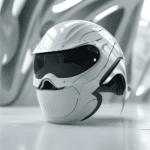Top Mental Wellbeing Gadgets for Effortless Inner Balance and Calm
Are you ready for the mental wellbeing revolution that’s changing lives with cutting-edge wellness tech? In today’s fast-paced world, achieving effortless inner balance and calm is more crucial than ever. This article delves into the top mental wellbeing gadgets harnessing innovative wellness tech to help you unlock a calmer, more resilient you.
Introduction
The integration of technology in our daily lives has led to an explosion of new products and tools designed specifically for mental wellbeing. From wearable stress trackers to AI-powered mindfulness coaches, the latest healthtech innovations have made it easier than ever to prioritize self-care and achieve a better work-life balance.
What is Wellness Tech?
We all know that technology has revolutionized many aspects of our lives, from communication to entertainment. However, the intersection of technology and wellness is an area that’s gaining significant attention in recent years. Also known as ‘healthtech,’ this category encompasses various digital solutions aimed at improving mental and physical health.
Key Benefits of Wellness Tech
- Mental wellbeing monitoring**: Wearable devices and apps can track stress levels, sleep patterns, and emotional states, allowing users to gain valuable insights into their mental health.
- Personalized wellness plans**: AI-powered tools can analyze user data and offer tailored recommendations for improving mental wellbeing, including meditation techniques, exercise routines, or nutrition advice.
- Community support**: Many wellness apps and online platforms connect users with like-minded individuals, fostering a sense of belonging and accountability in their mental health journeys.
The Top Mental Wellbeing Gadgets for Effortless Inner Balance and Calm
Below are some of the most effective mental wellbeing gadgets that harness innovative wellness tech to help you achieve a calmer, more resilient state.
Biofeedback Devices
Biofeedback devices use sensors and algorithms to monitor physiological responses such as heart rate, skin conductance, or brain activity. By providing real-time feedback on your bodily responses, these gadgets enable users to develop greater awareness of their emotional states and make conscious choices to manage stress.
Examples:
- Muse Brain Sensing Headband**: Tracks brain activity and provides personalized meditation guidance for improved focus and relaxation.
- HeartMath InnerBalance**: Uses electrocardiogram (ECG) data to monitor heart rate variability and offers insights into emotional states, helping users develop greater self-awareness.
Wearable Stress Trackers
Wearable devices such as smartwatches or fitness trackers can monitor physiological responses like heart rate, blood pressure, or skin conductance to track stress levels. Some wearables also offer guided breathing exercises or meditation sessions to help users manage anxiety and promote relaxation.
Examples:
- Fitbit Versa**: Tracks daily activity, sleep patterns, and heart rate variability to provide a comprehensive picture of your physical and mental wellbeing.
- Garmin Vivosport**: Offers advanced stress tracking features, including heart rate variability analysis and personalized recommendations for reducing anxiety.
Ai-Powered Mindfulness Coaches
AI-powered mindfulness coaches use machine learning algorithms to analyze user data and offer tailored meditation guidance. These tools can adapt to individual needs, providing a more effective and engaging experience than traditional mindfulness apps.
Examples:
- Wysa**: An AI-powered mental health coach that offers personalized advice on stress management, anxiety reduction, and sleep improvement.
- Calm**: A meditation app that uses AI to create customized relaxation plans based on user preferences and goals.
The Future of Mental Wellbeing Gadgets: Trends and Predictions
As the wellness tech industry continues to evolve, we can expect to see several trends and innovations in mental wellbeing gadgets. Some predictions include:
Increased Focus on Neuroplasticity
- The integration of neuroplasticity principles into mental wellbeing gadgets will become more prominent, helping users rewire their brains for improved emotional regulation.
- This trend will be driven by advancements in brain-computer interfaces (BCIs) and the development of more sophisticated AI-powered coaching tools.
More Emphasis on Social Connection
- Mental wellbeing gadgets will increasingly prioritize social connection, recognizing that community support is a vital component of maintaining good mental health.
- This trend will be fueled by the growing demand for online platforms and apps that facilitate connections between users with shared interests or goals.
Additional Sources of Information
For further reading on mental wellbeing gadgets and wellness tech, consider exploring the following reputable sources:
1. The World Health Organization (WHO)
WHO provides comprehensive resources on mental health, including guidelines for assessing and addressing anxiety disorders.
Source:
“Mental health is an integral part of overall health and well-being.” – World Health Organization
2. The National Institute of Mental Health (NIMH)
NIMH offers evidence-based information on mental health conditions, including anxiety disorders, depression, and trauma.
Source:
“Mental health is a critical aspect of overall health and well-being.” – National Institute of Mental Health
3. The Journal of Positive Psychology
This peer-reviewed journal explores the intersection of psychology, philosophy, and spirituality, with a focus on positive psychology and mental wellbeing.
Source:
“Positive psychology is an approach to understanding human functioning that emphasizes strengths and virtues.” – Journal of Positive Psychology
Explore more in our category page or visit our homepage.



